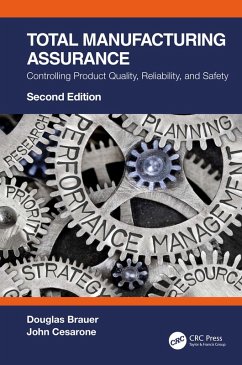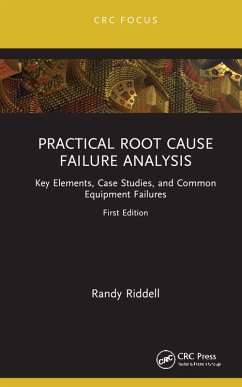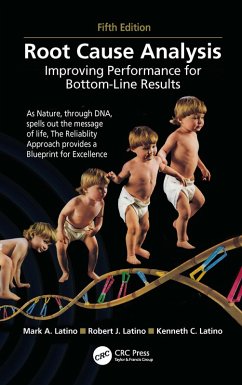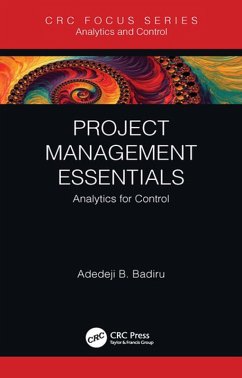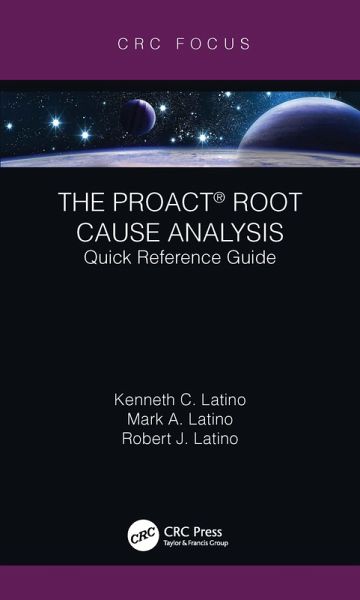
The PROACT® Root Cause Analysis (eBook, PDF)
Quick Reference Guide
Versandkostenfrei!
Sofort per Download lieferbar
19,95 €
inkl. MwSt.
Weitere Ausgaben:

PAYBACK Punkte
10 °P sammeln!
Root Cause Analysis, or RCA, "What is it?" Everyone uses the term, but everyone does it differently. How can we have any uniformity in our approach, much less accurately compare our results, if we're applying different definitions? At a high level, we will explain the difference between RCA and Shallow Cause Analysis, because that is the difference between allowing a failure to recur or dramatically reducing the risk of recurrence.In this book, we will get down to basics about RCA, the fundamentals of blocking and tackling, and explain the common steps of any investigative occupation. Common i...
Root Cause Analysis, or RCA, "What is it?" Everyone uses the term, but everyone does it differently. How can we have any uniformity in our approach, much less accurately compare our results, if we're applying different definitions? At a high level, we will explain the difference between RCA and Shallow Cause Analysis, because that is the difference between allowing a failure to recur or dramatically reducing the risk of recurrence.
In this book, we will get down to basics about RCA, the fundamentals of blocking and tackling, and explain the common steps of any investigative occupation. Common investigation steps include:
We explore, "Why don't things always go as planned?" When our actual plans deviate from our intended plans, we usually experience some type of undesirable or unintended outcome. We analyze the anatomy of a failure (undesirable outcome) and provide a step-by-step guide to conducting a comprehensive RCA based on our 3+ decades of applying RCA as we have successfully practiced it in the field.
This book is written as a how-to guide to effectively apply the PROACT® RCA methodology to any undesirable outcome, is directed at practitioners who have to do the real work, focuses on the core elements of any investigation, and provides a field-proven case as a model for effective application.
This book is for anyone charged with having a thorough understanding of why something went wrong, such as those in EH&S, maintenance, reliability, quality, engineering, and operations to name just a few.
In this book, we will get down to basics about RCA, the fundamentals of blocking and tackling, and explain the common steps of any investigative occupation. Common investigation steps include:
- Preserving evidence (data)/not allowing hearsay to fly as fact
- Organizing an appropriate team/minimizing potential bias
- Analyzing the events/reconstructing the incident based on actual evidence
- Communicating findings and recommendations/ensuring effective recommendations are actually developed and implemented
- Tracking bottom-line results/ensuring that identified, meaningful metrics were attained
We explore, "Why don't things always go as planned?" When our actual plans deviate from our intended plans, we usually experience some type of undesirable or unintended outcome. We analyze the anatomy of a failure (undesirable outcome) and provide a step-by-step guide to conducting a comprehensive RCA based on our 3+ decades of applying RCA as we have successfully practiced it in the field.
This book is written as a how-to guide to effectively apply the PROACT® RCA methodology to any undesirable outcome, is directed at practitioners who have to do the real work, focuses on the core elements of any investigation, and provides a field-proven case as a model for effective application.
This book is for anyone charged with having a thorough understanding of why something went wrong, such as those in EH&S, maintenance, reliability, quality, engineering, and operations to name just a few.
Dieser Download kann aus rechtlichen Gründen nur mit Rechnungsadresse in A, B, BG, CY, CZ, D, DK, EW, E, FIN, F, GR, HR, H, IRL, I, LT, L, LR, M, NL, PL, P, R, S, SLO, SK ausgeliefert werden.





